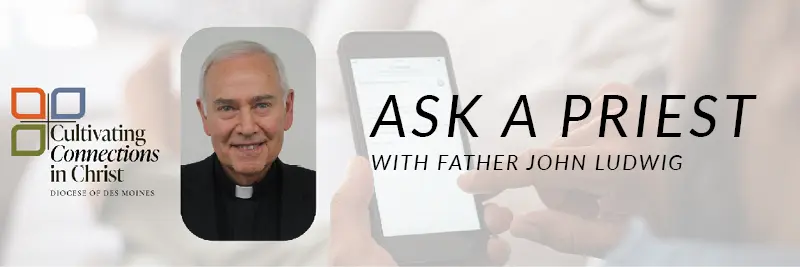Questions on Christianity, the death penalty, and the Anointing of the Sick
by Father John Ludwig | August 13, 2024

Q. Can you tell me when Christianity began? I’ve completed reading the Bible three times and wonder also about where it is in the Bible. Acts of the Apostles? -Sally Schroeder
A. Of course, Christianity began with Jesus himself. When he had chosen the apostles and the many disciples, you could say that Christianity had begun. However, after the resurrection and ascension, the disciples proclaimed the faith and welcomed many converts. A more precise answer can be found in the Acts of the Apostles 11:26. Barnabas brought Saul to Antioch. “For a whole year they met with the church and taught a large number of people, and it was in Antioch that the disciples were first called Christians.” The challenge, of course, is for all of us to live our lives as a witness to our faith in the good news that Jesus brought. And, in that sense, Christianity is still developing and growing. Matthew 7:21 tell us “Not everyone who says to me, ‘Lord, Lord,’ will enter the kingdom of heaven, but only the one who does the will of my Father in heaven.
Q. Does the Church stand against the death penalty or is it permitted to execute a prisoner? - Anonymous
A. Over the centuries and over the last several decades, there has been an evolution in the Church’s teaching about capital punishment. The Old Testament commandment “Thou shalt not kill” was liberally abrogated for a number of situations, usually for the commission of murder, but also for other crimes. Some have quoted the Code of Hammurabi injunction “an eye for an eye, and a tooth for a tooth.” But that quote was a limitation on killing – in other words, if someone put out your eye, the most you could do was to put out the aggressor’s eye; you weren’t allowed to kill the aggressor. It’s hard to imagine Jesus suggesting that it is acceptable to kill under any circumstances. Kings and queens have allowed, even encouraged, putting people to death for a number of reasons. The protection of society was given as the motivation.
St. John Paul II cautioned that in today’s world, imprisonment was certainly enough to protect society from the threat of further danger by a murderer. Pope Francis said, in 2017, “the Church teaches, in the light of the Gospel, that ‘the death penalty is inadmissible because it is an attack on the inviolability and dignity of the person’, and the Church works with determination for its abolition worldwide.”
Putting someone to death today can rightly be called society’s revenge. It seems we have found all kinds of reasons not to observe the commandment, “Thou shalt not kill.” King Henry VIII in England condemned Sir Thomas More to death because he would not sign the oath of allegiance permitting Henry to divorce his wife. It’s not an exaggeration to say that today the Church is clearly opposed to capital punishment. It’s an important pro-life stance.
Q. Can a person receive the Anointing of the Sick multiple times? I remember being taught that it was to be received only once. - Anonymous
A. The short answer is yes. Following the Second Vatican Council, the teaching regarding the sacraments was updated to allow a number of changes. Catholics used to refer to the “last rites” as a once-in-a-lifetime sacrament. We no longer call this sacrament the “last rites.” The Church instead calls this the sacrament of the Anointing of the Sick. It can be conferred when someone is in old age and/or in serious illness. It can be repeated during a longtime illness. It can also be celebrated in a communal way with the parish community during a weekday or a weekend Mass. It can also be celebrated in care centers.
If someone has already died, the Church does not anoint a dead body. Rather, there are compassionate prayers and blessings for the deceased person in the ritual book.
Have a question you want answered? Send them to communications@dmdiocese.org.